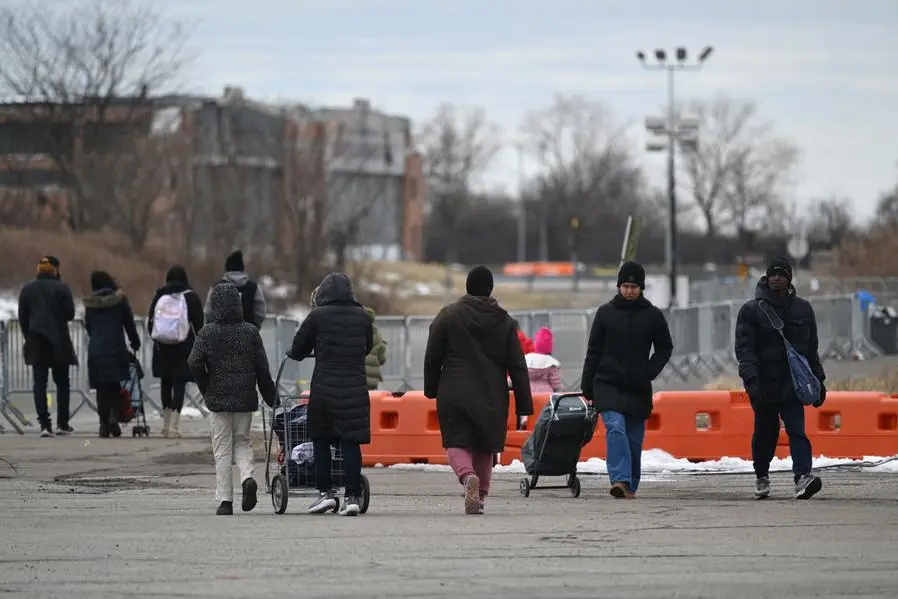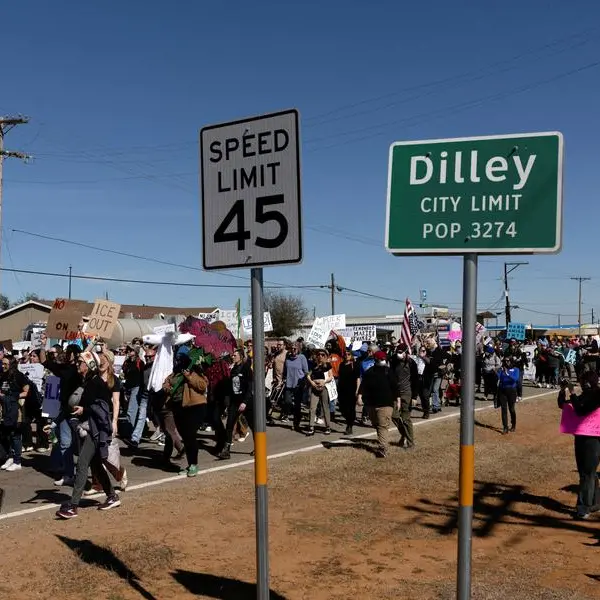PHOTO
Gusts of wind lash the runways of a former airfield in New York as migrant families with children slowly walk across, eyeing the city's world-famous skyline off in the distance.
The field, described by aid workers as in the "middle of nowhere," is providing emergency shelter for 1,800 migrants, a potent symbol of the immigration crisis facing the American metropolis.
Asylum seekers flanked by hangars and runways tell AFP they want to "start over from scratch."
Many of the migrants at Floyd Bennett Field come from Latin America and Africa, but some are from China and Russia.
In large tents, with additional shared areas for eating and doing paperwork, up to 500 families sleep side-by-side in cramped, subdivided spaces.
"It's a bit difficult," says David Fernandez, 32, from Ecuador, describing cold, noisy conditions and the site's distance from the city.
Manhattan's skyscrapers are visible from the runways, but still more than an hour away on public transport.
There are no shops or other services in the immediate vicinity.
"We can't complain, because they're helping us... We have a roof over our heads to rest under, and blankets," Fernandez says stoically, happy that his son, 11, and daughter, seven, got into a Brooklyn school.
Humanitarian crisis
In November the Fernandez family left their home in Ecuador, which has been gripped by drug violence.
After almost two weeks journeying through Central America and a two-and-a-half day bus ride from Texas, they finally arrived in New York.
"I have to stay in the camp until I can find a house and a job," says Fernandez, one of the 2.4 million to have illegally crossed from Mexico into the United States in 2023, creating a political divide between Democrats and Republicans in a presidential election year.
The long white tents of Floyd Bennett Field are cordoned off behind metal fences.
And while New York Mayor Eric Adams has called the situation a "humanitarian crisis" -- fanned by Texas Governor Greg Abbott busing in migrants who arrive in his state -- the Big Apple is no stranger to newcomers.
During the 20th century, New York was the port of entry for millions of immigrants and in 1979 it committed legally to shelter all of the city's inhabitants.
But since spring 2022, authorities have scrambled to provide emergency accommodation for more than 180,000 people from as far afield as Venezuela, Senegal and Russia, among other countries.
More than 65,000 people are at one of the more than 210 migrant shelters which include hotels, gymnasiums and "humanitarian centers" like the airfield camp.
'No privacy'
"Many of them arrived without having a friend or neighbor to help them," says Victoria Marin, a Brooklyn resident who organizes blankets and warm clothing for migrants at the site.
"Each time we've come, we've had 40 to 50 people running towards the car and asking for blankets, coats, shoes, food, strollers, suitcases."
The decision to house people at the isolated facility has been criticized.
"Floyd Bennett Field is not at all an appropriate place to house homeless families with children," says Dave Giffen, director of the non-profit Coalition for the Homeless.
"They're out really in the middle of nowhere on the edges of Brooklyn... There's no privacy... The showers and toilets are in separate tents outside the sleeping quarters," he says.
In January, authorities had to evacuate the camp due to a winter storm, relocating migrants to a local high school for the night.
Students there were unable to attend classes the next day, angering parents and officials.
New York City has been "left alone" by national and state authorities, Giffen says, and now it "wants to discourage migrants from coming to New York."
'A safe country'
The city's health department, which operates the center, insists newcomers are fed, receive medical care, and get help from social workers to apply for asylum, seek training and employment, and send their children to school.
Bus service has also been established to simplify travel to New York.
Mayor Adams, a Democrat, has repeatedly said the city "is running out of space," criticizing President Joe Biden for failing to provide federal aid to assist or expedite work permits for asylum seekers.
"My aim is to work, to study, to free myself from (relying on) the government, and to fight for my children," says Venezuelan Maricruz Figueroa, 30, as she walks across the runway wearing a jersey emblazoned with the word "Brooklyn."
"The most important thing is that this is a safe country," adds Luis Moreno, from Ecuador. "A country of opportunities, where there is no crime like the third-world country that I come from."





















